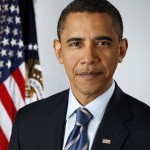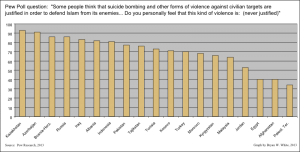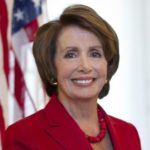 “[S]ome extremists [believe] that Islam is in conflict with the United States and the West, and that violence against Western targets, including civilians, is justified in pursuit of a larger cause. Of course, this ideology is based on a lie, for the United States is not at war with Islam. And this ideology is rejected by the vast majority of Muslims, who are the most frequent victims of terrorist attacks.”
“[S]ome extremists [believe] that Islam is in conflict with the United States and the West, and that violence against Western targets, including civilians, is justified in pursuit of a larger cause. Of course, this ideology is based on a lie, for the United States is not at war with Islam. And this ideology is rejected by the vast majority of Muslims, who are the most frequent victims of terrorist attacks.”
—President Barack Obama, March 23, 2013
Overview
The president’s statement suffers from ambiguity and sends a mixed message as a result.
The Facts
On March 23, 2013, President Obama gave a speech focused on fighting terrorism. In that speech, Mr. Obama offered a description and critique of the ideology of our primary terrorist foes (bold emphasis added):
[W]e have to recognize that these threats don’t arise in a vacuum. Most, though not all, of the terrorism we faced is fueled by a common ideology — a belief by some extremists that Islam is in conflict with the United States and the West, and that violence against Western targets, including civilians, is justified in pursuit of a larger cause. Of course, this ideology is based on a lie, for the United States is not at war with Islam. And this ideology is rejected by the vast majority of Muslims, who are the most frequent victims of terrorist attacks.
We’ll start to evaluate the rhetoric before trying to find facts that help us gauge the accuracy of Mr. Obama’s statement.
Analyzing the Rhetoric
The president describes a two-part extremist ideology. First, the extremist regards the U.S. as in conflict with Islam. Second, the extremist believes violence, including violence against civilians, serves as an appropriate response to the U.S. in the context of the perceived conflict.
But Mr. Obama muddies the water a bit as he continues his remarks. He says the extremists’ ideology is “based on a lie” since the U.S. is not at war with Islam. That’s the start of the ambiguity, for a conflict is not necessarily a war, and the president said “conflict” when he introduced the two-part ideology.
We might assume that the president is clarifying “conflict” by narrowing its meaning to “war.” But if we do that, then we cut from the extremists’ camp those who believe that it is appropriate to respond with violence to a non-war conflict between the U.S. and Islam.
In keeping with the principle of charitable interpretation, we sought poll and survey data reflecting Muslims’ attitudes toward the U.S., covering perceptions of conflict or war as well as the appropriateness of responding violently. Such data will help provide a contextual framework for the president’s claim that a vast majority of Muslims reject the extremist ideology.
2009 PIPA: “Public Opinion in the Islamic World on Terrorism, al Qaeda, and US Policies”
Finding recent poll data on Muslims’ perception of a “war on Islam” proved difficult after 2008. Apparently pollsters lost interest in the subject not long after Mr. Obama took the presidential oath.
The most recent such poll we located was published by the Project on International Policy Attitudes in February 2009 (bold emphasis added):
There is a widespread majority belief that the United States seeks “to weaken and divide the Islamic world,” and this belief seems at least as strong now as it was two years ago. In Egypt 87 percent said they thought this was a US goal (82% definitely a goal). In Indonesia, 62 percent said so, though they were less categorical about it (22% definitely a goal). In Pakistan, 74 percent said it is a US goal (55% definitely). In late 2006 78 percent of Moroccans said this was a US goal (49% definitely).
This question was also asked in four other Muslim nations. Large majorities everywhere saw weakening and dividing Islam as a US goal: 87 percent in the Palestinian territories, 82 percent in Turkey, 80 percent in Jordan, and 65 percent in Azerbaijan.
The PIPA poll provides some evidence potentially undercutting Mr. Obama’s claim, though PIPA has not repeated the poll question since Obama took office. A decline in U.S. popularity in Muslim nations since Obama’s first year in office suggests little improvement in the perception of U.S. hostility toward Islam.
2013 Pew Research: “The World’s Muslims: Religion, Politics and Society”
A 2013 Pew Research poll found that about 75 percent of Muslims opposed suicide bombing in defense of Islam. The question specifically mentioned civilians:
Some people think that suicide bombing and other forms of violence against civilian targets are justified in order to defend Islam from its enemies… Do you personally feel that this kind of violence is:
The poll offered poll respondents four choices, including “never justified.” The question yielded a wide range of answers by country, ranging from a high of 93 percent in Kazakhstan to a low of 34 percent in the Palestinian territory. The median figure was 73 percent, in Tunisia.

A word of caution about the numbers: Pew Research did not do polling in every nation with a Muslim population, and its polling in some countries was too sparse to include in the totals. These numbers give us only a rough idea of the opinions of the global Muslim population.
We found no other poll that addressed the issue of violence against civilians in the name of Islam nearly as closely as this one. It’s likely the president’s claim was intended to rely on this poll.
Ambiguity soup
The president’s description leaves us with three key points described in fuzzy terms. Is conflict with Islam the same as “war”? Is “some extremists” a large number or a small number? What is “a vast majority,” exactly?
The polls do little to clear things up. The polls indicate Muslims perceive a fundamental conflict between the United States and Islam. But is this the “war” Obama talked about? If the U.S. is not literally at war with Islam, does this alter the Muslim perception of an anti-Islam policy from the U.S.? And when Muslims express a willingness to defend Islam using attacks on civilians, are they talking about defending Islam based on anti-Islam policies short of literal war?
Why even try to nail this Jell-O to the wall?
It’s an important blob of Jell-O. The president’s statement provides the basis for his administration’s response to terrorism. Even if we can’t give it a fixed position on the wall, we can evaluate the rhetoric as to its role in U.S. foreign policy.
We think the lack of clarity reflects design. The president’s overall statement is true given just a small amount of charity. While many Muslims perceive a conflict with the U.S., it remains a minority who also think killing civilians qualifies as an appropriate response to the problem. That minority may make up more people than the average listener thinks, but Mr. Obama nicely skirts that problem with vagueness. If just 1 percent of the 1.6 billion Muslims worldwide favor responding to conflict with the U.S. by using violence against civilians, we’re talking about 16 million extremists.
That’s how vague Mr. Obama’s statement ends up after examination.
Summary
“[S]ome extremists [believe] that Islam is in conflict with the United States and the West, and that violence against Western targets, including civilians, is justified in pursuit of a larger cause.”
Most Muslims surveyed perceive a conflict with the U.S. and the West, but a minority hold that belief in conjunction with justifying the use of violence against civilians to help resolve the conflict. “Some extremists” could be millions. Poll data don’t support concluding that a very small number of Muslims hold the extremist ideology Mr. Obama identifies.
“Of course, this ideology is based on a lie, for the United States is not at war with Islam.”
Charitably read as “the United States is not in conflict with Islam,” the president is making a theological statement, kind of like issuing a fatwa declaring the U.S. not in conflict with Islam. That reading makes the statement an opinion. That opinion may carry weight with like-minded people in the West, but isn’t likely to convince Muslim skeptics.
Less charitably, the president may have deliberately equivocated (a type of the fallacy of ambiguity), stating that since the U.S. is not literally at war with Islam therefore no conflict with Islam exists. It’s worth noting that Steven Kull of World Public Opinion appeared to directly tie Muslim perceptions of a war against Islam to the attempt to undermine Islam:
But now there is also a new feeling about the US that has emerged in the wake of 9-11. This is not so much an intensification of negative feelings toward the US as much as a new perception of American intentions. There now seems to be a perception that the US has entered into a war against Islam itself.
I think perhaps the most significant finding of our study is that across the four countries, 8 in 10 believe that the US seeks to “weaken and divide the Islamic world.”
Based on the charitable interpretation, we won’t rate the truth value of Mr. Obama’s latter statement.
“And this ideology is rejected by the vast majority of Muslims, who are the most frequent victims of terrorist attacks.”
Again, by making approval of attacks against civilians a necessary part of the ideology in question, Mr. Obama’s statement qualifies as true. That’s not a big stretch. But it encourages overestimation of the number of Muslims who reject violence against civilians in defense of Islam, and it encourages underestimation of the number of extremist Muslims who hold to the minority ideology the president identifies.
We trust that the president is accurate about identifying Muslims as the most frequent victims of terrorism by the extremists. We have a blog post in the works that may help shed light on that aspect of terrorism in the Muslim world.
References
Obama, Barack. “Remarks by the President at the National Defense University.” The White House. The White House, 23 May 2013. Web. 27 May 2013.
Kull, Steven, Clay Ramsay, Stephen Weber, Evan Lewis, and Ebrahim Mohseni. “Public Opinion in the Islamic World on Terrorism, Al Qaeda, and US Policies.” WorldPublicOpinion.org. World Public Opinion: Global Public Opinion on International Affairs, 25 Feb. 2009. Web. 4 June 2013.
“Global Opinion of Obama Slips, International Policies Faulted.” Pew Global Attitudes Project RSS. Pew Research Center, 13 June 2012. Web. 04 June 2013.
“Global Opinion of Obama Slips, International Policies Faulted.” Pew Global Attitudes Project RSS. Pew Research Center, 13 June 2012. Web. 04 June 2013.
“The World’ S Muslims: Religion, Politics and Society.” The Pew Forum on Religion and Public Life. The Pew Forum on Religion & Public Life, 30 Apr. 2013. Web. 04 June 2013.
“The World’ S Muslims: Religion, Politics and Society.” The Pew Forum on Religion and Public Life. The Pew Forum on Religion & Public Life, 30 Apr. 2013. Web. 04 June 2013.
Kull, Steven. “Negative Attitudes toward the United States in the Muslim World: Do They Matter?” WorldPublicOpinion.org. World Public Opinion: Global Public Opinion on International Affairs, 17 May 2007. Web. 06 June 2013.
More works consulted
“Muslims Believe US Seeks to Undermine Islam.” WorldPublicOpinion.org. World Public Opinion: Global Public Opinion on International Affairs, 24 Apr. 2007. Web. 06 June 2013.
“Muslim Publics Oppose Al Qaeda’s Terrorism, But Agree With Its Goal of Driving US Forces Out.” WorldPublicOpinion.org. World Public Opinion: Global Public Opinion on International Affairs, 24 Feb. 2009. Web. 06 June 2013.
Kull, Steven. “Why Muslims Are Still Mad at America.” WorldPublicOpinion.org. World Public Opinion: Global Public Opinion on International Affairs, 9 Sept. 2011. Web. 06 June 2013.
“The Great Divide: How Westerners and Muslims View Each Other.” Pew Research Global Attitudes Project. Pew Research Center, 22 June 2006. Web. 06 June 2013.
“Arab Spring Fails to Improve U.S. Image.” Pew Research Global Attitudes Project. Pew Research Center, 17 May 2011. Web. 06 June 2013.
“On Anniversary of Bin Laden’s Death, Little Backing of Al Qaeda.” Pew Research Global Attitudes Project. Pew Research Center, 30 Apr. 2012. Web. 06 June 2013.
“The World’ S Muslims: Unity and Diversity.” The Pew Forum on Religion and Public Life. The Pew Forum on Religion & Public Life, 9 Aug. 2012. Web. 06 June 2013.
Greenwald, Glenn. “Obama’s Growing Unpopularity in the Muslim World.” Salon.com. Salon Media Group, Inc, 5 Aug. 2010. Web. 06 June 2013.
Telhami, Shibley. “2010 Annual Arab Public Opinion Survey.” The Brookings Institution. Anwar Sadat Chair for Peace and Development, 5 Aug. 2010. Web. 6 June 2013.
Naurath, Nicole. “Most Muslim Americans See No Justification for Violence.” Gallup World. Gallup, Inc., 2 Aug. 2011. Web. 06 June 2013.
Updated 12/6/2018: A reader, Anna, alerted us that the link to the Pew Report on Muslim attitudes (“The World’s Muslims: Unity and Diversity”) was no longer available at the URL we used. We have substituted the corresponding URL from the Internet Archive.







